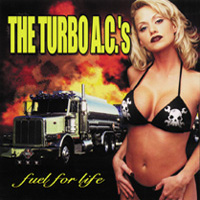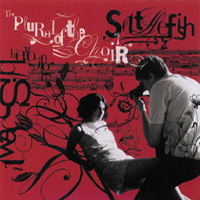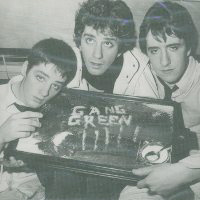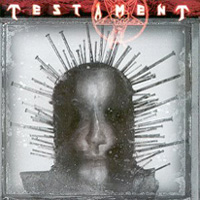 Testament
Testament
Demonic (Atlantic)
An interview with Chuck Billy
by Scott Hefflon
The main question I have to ask is about your vocal style change from melodically thrashy to death metal. Did it pre-date Demonic, and why did you change so drastically?
“Dog Faced Gods” on Low in ’94 was the first time I did an entire song with the death metal voice, and I got a lot of great response and fan mail because of that song. People seemed to really like that approach. So for Demonic, while it wasn’t really intended, we were trying to figure out a way to top Low. Once we started writing, the music started taking a more aggressive approach. It seemed natural. I was experimenting with the old vocal style with the Demonic material, but every time I would switch over to the death voice, Eric (Peterson, guitarist) and them would look over and say, “Yeah, sing it like that.”
You even call it “the death voice?”
Yeah, well, I don’t really know how else to describe it.
It just sounds like something a journalist scumbag like me would call it, while you’d say, “No, it’s the voice I use to express my inner demon,” or some artsy shit like that.
I’ve been doing that voice live for 10 years, I just never really used it on the records. But this time around it just seemed like the natural way to go, especially with the popularity of bands like Fear Factory and Sepultura.
Was there a specific reason why you didn’t record that voice before?
When Alex (Skolnick, former lead guitarist) was in the band, he didn’t like that voice. Back then, a band decision had to be unanimous. And Alex never cared for that vocal style. But as Alex ended his career with Testament, and for the most part, with metal altogether, the compromises came to an end. By The Ritual, which was his last album with us, the music and the vocals had gotten even softer. But with Alex gone, Eric and I were like, “Man, we can be heavy again.” When we did Low, that was a step in the direction of where we wanted to go. Eric had to make the most compromises. He wrote a lot of riffs, knowing Alex wasn’t going to like them. Eric wrote the whole Ritual album while Alex was on tour with Stu Hamm, and when Alex came home, he started bitching that he didn’t want to play leads over the double bass, he didn’t want to play solos over the thrash parts, he wanted to tame it down, and Louie (Clemente, former drummer) was right at his side. They wanted to be more commercial, more accessible, writing hit singles or whatever. Atlantic records was really putting the pressure on us for that kind of stuff.
 What was the time period? We’re talking the early ’90s, a kind of dark ages for metal, right?
What was the time period? We’re talking the early ’90s, a kind of dark ages for metal, right?
The Ritual was in ’92, I believe. That was a tough time for us, we were in an awkward situation. Eric, Greg (Christian, former bassist), and myself wanted to be in a heavier band, but being on Atlantic Records and having the pressures of them coming to us and straight out asking us to do an “alternative” record, and us being like, “Yeah, right, we don’t even know where to start.” For them to even ask us was just shocking. We made it this far, selling this many records, doing what we do, because that’s what we do. They just see that maybe we’ll get successful for that one song, that one single, but what are the repercussions? A few years after that, the fans say, “yeah, they sold out. They used to be heavy.” Metal fans are some of the most loyal fans. If you stick by them, they’ll stick by you.
When, actually did Testament/Legacy begin?
Those guys started in ’82, with Steve Souza (Zet) singing for them. He was a friend of mine, we grew up together. When he quit Legacy to join Exodus ’cause he thought it’d be a better situation, it turned out to be a blessing in disguise for me. Steve turned me onto the band, I got their demo, a demo that was the biggest-selling demo in Europe, and they had about 12 labels chasing them. I stepped in and we already had a record deal.
That was Megaforce/Atlantic, and now 10 years later you release both Demonic and Signs of Chaos: The Best of Testament on Burnt Offerings (his label)/Mayhem (formerly Futurist/Mechanic)/Atlantic. Kinda full circle.
Yeah, but it’s cool because it begin and ends with us. This time around, we wrote and delivered the record, complete with artwork and layout, and then we license it to Mayhem in the U.S., and Music for Nations in Europe, and so forth. It’s been pretty sweet. When we did Low, Atlantic didn’t do anything for the record. We were really disappointed because we thought that was our best record at the time. They just totally turned their back on it. At that point, we negotiated our way out of the contract, and Jonny Z, who was managing us at the time, inspired us to start our own label and release it that way. That’s when we did Live at the Fillmore, to test the waters. It took up a lot more of our time, but it wasn’t really that difficult. From that point on, we knew that was the way to go – to put out the records on our own.
You’ve gone through so many members, so many great metal musicians…
Totally. Eric and I are the only original members left. It’s funny ’cause Derrick (Ramirez), the bass player, was the original guitar player in Legacy before Alex. He’s Eric’s cousin, so they were the ones that started the band in 1982.
Is Gene Hoglan still in the band?
No, he was brought in just to play drums on Demonic. We had the whole record done, demo-wise, so we called Gene to record it with us. He flew up for three or four months, rehearsed and recorded the record. He mentioned he wanted to go on tour, and we thought that’d be great. But when it came time, he was committed to Strapping Young Lad and he wasn’t going to turn his back on those guys, so we had to find a permanent member. That’s when I knew Jon (Dette, drummer) was sitting in San Diego all bummed out ’cause he just got released by Slayer, and I asked him if he wanted to tour the Demonic record with us. It took him two seconds to say sure. He rehearsed for five days before we did the Dynamo Festival.
Testament’s been a kind of stepping stone for a lot of musicians.
And there’s nothing wrong with that. As long as Eric and I are writing together, it’ll always sound like Testament. We’ve jammed with some amazing musicians. Like Johnny Tempesta, from White Zombie. He’s one of the best drummers I’ve ever worked with. Before that it was Paul Boststaph, who went on to Slayer, then Truth About Seafood, but is now back in Slayer.
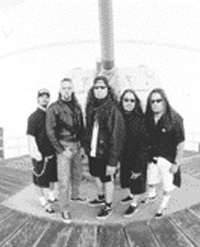 Whatever happened to Alex?
Whatever happened to Alex?
He’s playing jazz in San Francisco. Walk-in gigs and free-for-all jams, but he’s not into metal at all anymore. Alex has a solo album coming out on Shrapnel records pretty soon. I’m curious to see what that’s going to be like. I hear it’s really progressive.
What’s that mean to you?
It doesn’t mean metal.
James Murphy (guitarist, for a time, in Testament) did a solo record for Shrapnel. I remember it being the only one of the bunch that wasn’t total guitar wank.
I’ve known Varney (Mike, owner of Shrapnel) for a long time. He released the first material I ever did back in ’82. I was jamming with a hotshot guitarist in the Bay area at the time named Danny Gill, and everyone wanted him.
Where did he end up?
He moved to L.A. and became a teacher at G.I.T. (Guitar Institute of Technology), and I think he’s still down there teaching. Alex actually took lessons from Danny, and Danny was Alex’s idol for a long time. Danny actually studied under Joe Satriani for many years prior to that. Danny was a real hotshot there for a while in the early ’80s. But he got into that L.A. scene, and that type of music wasn’t really called for outside of L.A..
What was the Bay Area like in the early days?
It was great. It was like a family. It’s not really that different today. There were some great bands like Exodus, Vio-lence, Heathen, Forbidden, Death Angel… There was a time in the middle there where Faith No More and Primus started getting really big, so a lot of bands started changing to be more like them. But then a lot of cool, classy clubs started closing down, and after a while there was no place to play, no place hip to go, the scene was changing.
The chants of “metal is dead” have been going on for so long, you just can’t believe ’em anymore. It’s funny because you hear Demonic referred to as having a Pantera-ish sound, yet Testament pre-dates Pantera even when they were a spandex-wearing cover band.
We used to go to Texas to film all of our videos, so we used to go down to this local bar where Pantera used to play. But that’s when they used to just cover a bunch of our songs. So we used to jump up on stage and show them how it was really done. Eric gave Darrell a lecture about less-is-more in this music, and a year later Cowboys From Hell hits the street with a new image, a new sound, and the rest is history. This business is all about being in the right place at the right time with the right album. We were that way with our first three records. Timing just worked that way. And now, with Demonic, I think we’ve hit at the right time again. From talking with fans, I see metal on the rise again. Even without MTV or commercial radio, except specialty shows on college radio, fans are going to shows and buying records again. It’s more underground and less co-opted then it’s been in years, and that’s the way it should be.

